Whirlpool (1970)
Directed by: José Ramón Larraz
Written by: José Ramón Larraz, Sam Lomberg
Starring: Johanna Hegger, Karl Lanchbury, Pia Andersson, Vivian Neves
Denmark/UK
AVAILABLE ON BLU-RAY: 25th MARCH, from ARROW VIDEO in the BLOOD HUNGER: THE FILMS OF JOSE LARRAZ Boxset
RUNNING TIME: 92 mins
REVIEWED BY: Dr Lenera, Official HCF Critic
PLEASE NOTE: I apologise for the poor quality of the stills in this review which in no way reflect the Blu-ray presentation, but it was impossible to find decent shots from this film.
Extremely rabid photographer Theo lives in an isolated country estate with his lesbian aunt Sara whose latest conquest, a model named Rhonda, walks out on her. Sara visits another photographer friend and, seeing another model having some pictures taken, invites her round to her house. Though a little perturbed that a previous model disappeared there, Tulia excepts and arrives to soon find that both nephew and aunt are sexually interested in her. But what do they really have in store for her, what really happened to Rhonda, what’s so secret about Theo’s photography lab, and who’s that strange man lurking around?
Being a bit pushed for time this week, I opted not to accept our webmistress Bat’s offer to review all three of the film included in Arrow Video’s Blood Hunger: The Films Of Jose Larraz boxset, so instead Bat and Mocata will be doing write-ups on two of the films and I’ll just be doing this one. It will be interesting to see how our opinions differ. Spanish director Larraz is known for combining horror with eroticism in his work and is most famous for 1974’s Vampyres with its rampant, sexually-charged blood drinking scenes which I still recall quite vividly, though it’s been a long tine since I’ve seen the film and I don’t remember it to be much good otherwise, lacking the style of the similar offerings from Jess Franco [and that’s a rarity, I’ve given Franco some faint praise!] and Jean Rollin around the same period. But that was around twenty years ago and tastes change. In any case, I decided to go for Whirlpool [one of several films bearing that title], which was Larraz’s first feature and shot in England with principally Danish money. I expected a rather rough and ready effort with a leisurely pace dosed up with slices of pretty strong sex and violence for the time – and that’s pretty much what I got, except for the violence being quite scarce. But was it good? That’s a harder question to answer.
It’s certainly not devoid of interest. It unsurprisingly bears many of the flaws that a first film on a small budget might have, though it seems that Larraz’s subsequent work is very similar. It contains a fair bit of sex, but it feels joyless and isn’t really what I’d call erotic, though of course we all differ on what we find to be the latter. While a few other characters come and go, for much of the time the action is restricted to three people, and their interactions do hold the attention in what is a very slow burning piece even though we’re just watching two good performances instead of three – or maybe that last point adds to it. Psychologically it gets quite fascinating though don’t expect any real insights into damaged minds or sexual deviation here, and the character who’s supposed to be the most “normal” out of the three hardly ever behaves in a logical fashion – though it’s the same character who’s so badly played so at least you get some kind of consistency. And the script seems to think that viewers will wonder what on earth has happened to the first model who visits the house of Theo and Sara, and that the climactic revelation will come as a bit of a surprise. I mean for goodness sake it opens with Theo rowing a boat down a river and noticing a black boot on the bank where he alights. We never find out to whom the boot belongs to, but it seems like an extremely obvious hint to me. I don’t think that any spoiler warnings are required here, are they?
Said opening scene takes place in what looks very similar to an area of Buckinghamshire’s Black Park familiar from lots of Hammer films, though the photography from Julio Pérez de Rozas [which is rather good throughout] manages to slightly impart that off kilter sensation you often get when filmmakers from other countries shoot in locales familiar to us Brits. Cut to aunt Sara in bed with young Rhonda. “Two many whiskies last night darling or perhaps my cigarette? You’ll have to get used to them. The second time is always better” isn’t enough to stop Rhonda from getting up to leave. But never mind, Sara soon visits a friend and spots Tulia with ill-concealed [in fact it’s not concealed at all!] lust and invites her over – something that Tulia immediately accepts without asking any questions! Let’s get this out of the way – virtually nothing Tulia does make any kind of sense, such as not trying to leave when things are weird at the house and progressively get weirder. It’s possible that Vivian Neves is supposed to be playing an easily led air head which therefore means that her vapid performance is actually rather good, but then why is she often required to spout would-be philosophical stuff like “I sense an evil atmosphere of darkness, in which strange fearful powers predominate, terrifying powers beyond all understanding, which can terrify and torture you”. And actually I suppose that fleeing the house into the woods won’t do her much good, seeing as the lake “is a place where reality and fantasy mix, it’s like a dark mirror”. I just couldn’t buy that this character would say such things, and if she has some kind of psychic powers then why on earth would she have come to this place at all? Oh well, you can say that it kind off adds to the strange feel.
The hosts soon get their guest to play a game of strip poker with them while plying her with whisky and even a naughty cigarette – and if I’d had as much whisky as she seems to do then I’d have been under the table, though Tulia does soon find herself under Theo until it becomes apparent that he has trouble getting it up. This may partly explain why she then responds to Sara’s advances so quickly – though “quickly” probably isn’t the right word to use when talking about this film as its first two thirds do move pretty slowly and some scenes play out longer than was the norm for this kind of film even in 1970, though there’s no doubt that one’s interest is just about maintained. Larraz seeming to be kind of aiming for an early Roman Polanski feel which he does sometimes succeed in doing. The rain, wind and wildlife outside are constantly heard which adds a touch of the Gothic, though you have to laugh when Theo and Julia decide to leave a bar because of the noise, which is actually music from the soundtrack recorded really loud and which certainly doesn’t sound like it’s coming from a radio. Tulia eventually comes to thinking that Sara was in love with Rhonda and wants Tulia to replace her – though that’s not quite it really. Things do sort of pan out the way you expect – it won’t surprise you at all to learn that rape becomes an ingredient – though even I was surprised at how strong and lengthy a lesbian sex scene was. Small wonder that the BBFC removed several minutes from this film, and it probably wouldn’t have been violence as the several kills aren’t graphic at all, even if the final one has quite an upsetting nature to it and may remind some of Last House On The Left.
Others may be reminded of the giallo whilst watching this film – you could easily imagine Ernest Gastaldi cooking this story up but adding some creative murder set pieces and hopefully constructing it rather more carefully! On the evidence of this film, Larraz is no major stylist, but he does give us a rather freaky nightmare scene where Tulia imagines that Rhonda visits her bed before turning into Sara, the latter’s maniacal laugh sure leaving an impression. Tulia snooping around a room that she shouldn’t also has a creepy vibe to it, especially what with some horrid dolls on the wall. It does seem that Larraz struggled to stretch out Sam Lonberg’s original story in places but fortunately he was able to give things a weird enough vibe to prevent boredom from creeping in. And he is helped considerably by the performances of Karl Lanchbury [who reminded me of Hammer’s Shane Briant, and who would go on to star in Larraz’s next few movies] and Pia Andersson who does her best to add some layers to what is a very cliched predatory lesbian role which would probably get the PC mob all offended if the film came out today – or even in 1992 if you remember all the fuss made about a certain film full of sex and violence that came out that year. The music score from Stelvio Cipriani, a name that will be familiar to Mario Bava fans, also makes a fine contribution. It’s less groovy than some of his other stuff but still with that familiar sound and instrumentation that makes his music such a Euro treat – though it does contain a pocket watch-like theme that very much recalls the oft sampled Carrillion theme from For A Few Dollars More.
From what little I know, Whirlpool already contains many of the themes that Larraz would continue to look at in subsequent films. Even I noticed many similarities with Vampyres, from setting to even plot elements and situations. I’d be intrigued to find out if Larraz’s work lost something when he relocated to Spain, seeing as perversity and danger hidden away in rural England seems to be an idea he likes rather a lot. It tends to be very clumsy at times and there really is some seriously poor writing, but for what is basically just a grubby little exploitationer, and proud of the fact, it does have a certain mood, and you may find yourself more involved than you might think – though even I felt like I needed maybe not necessarily a shower but certainly a wash after watching it.
Whirlpool has been given what looks like to me a very impressive 2k restoration. As this review was based on a digital screener I can’t offer my opinion on the special features, but they seem very extensive, making this set a must-have for fans of this director and those interested in exploitation cinema of the period.
BLOOD HUNGER: THE FILMS OF JOSE LARRAZ
LIMITED EDITION CONTENTS
*Three films from José Ramón Larraz: Whirlpool, Vampyres and The Coming of Sin, all newly-restored in 2K from original film element
*English subtitles for the deaf and hard-of-hearing for all feature
*Newly commissioned artwork by Gilles Vranckx
*80-page perfect bound book featuring new writing by Jo Botting, Tim Greaves and Vanity Celis
WHIRLPOOL
*Original US Theatrical Cut
*Brand new audio commentary by Tim Lucas
*Obsessive Recurrence: The Early Films of José Larraz – author and critic Kim Newman reflects on the recurring themes and underlying obsessions linking together the early productions of José Larraz
*A Curious Casting – actor Larry Dann on the strange story behind his casting in Whirlpool
*Deviations of Whirlpool – featurette comparing the differences between the US Theatrical Cut and a previously circulated, alternate cut of the film
*Archival interview with José Larraz
*Image Gallery
*Trailer
VAMPYRES
*Brand new audio commentary by Kat Ellinger
*Brand new interviews with producer Brian Smedley-Aston, actors Marianne Morris, Anulka Dziubinska, Brian Deacon, Sally Faulkner, makeup artist Colin Arthur and composer James Kenelm Clarke
*Reimagining Vampyres – a brand new interview with Larraz s friend and collaborator Victor Matellano, director of the 2015 Vampyres remake
*Archival interview with José Larraz
*Jose Larraz and Marianne Morris Q&A at 1997 Eurofest
*Image Gallery
(Trailers
THE COMING OF SIN
*Spanish and English language versions of the feature
*Brand new audio commentary by Kat Ellinger
*Variations of Vice: The Alternate Versions of The Coming of Sin exploitation expert Marc Morris on the strange and scandalous release history of José Larraz’s most censored film
*Remembering Larraz: author and filmmaker Simon Birrell shares his memories of José Larraz
*His Last Request – a short film by Simon Birrell
*Archival interview with José Larraz
*Image Gallery
*Trailer

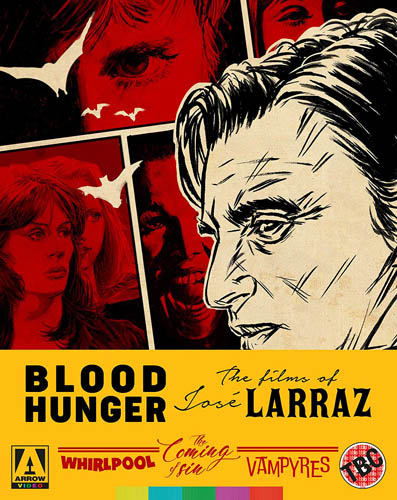
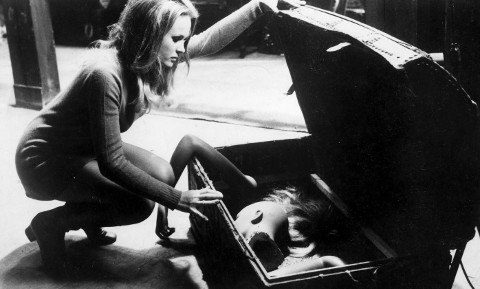
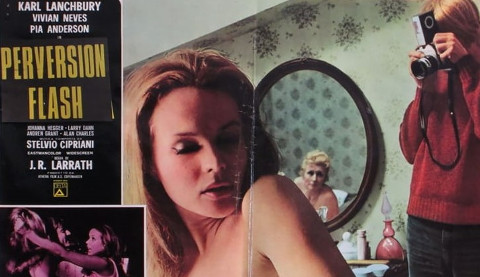




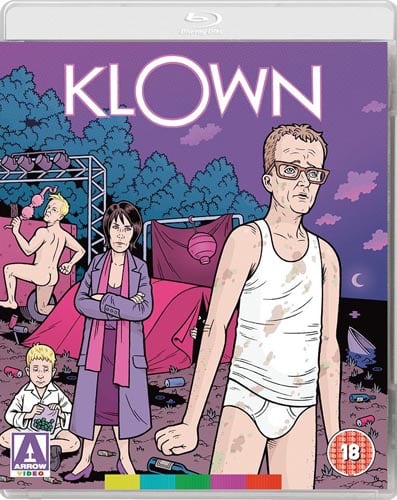
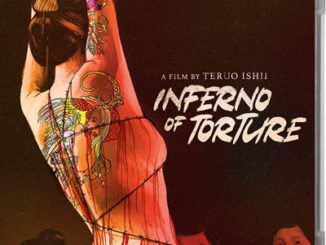

Be the first to comment